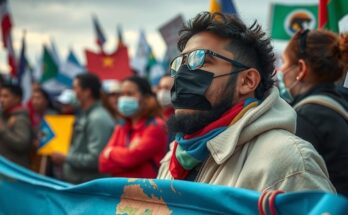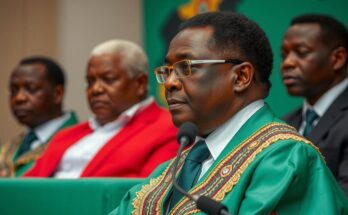Yamandú Orsi secured victory in Uruguay’s presidential runoff election, defeating Álvaro Delgado with a vote margin of 49% to 46%. His win reflects anti-incumbent sentiment amid economic challenges, marking a return to leftist leadership. With plans for economic reforms and social inclusivity, Orsi pledges to unite the nation as he prepares to take office on March 1, 2025.
In a closely contested runoff election held on Sunday, leftist candidate Yamandú Orsi emerged victorious, defeating the conservative governing coalition and signaling a significant political shift in Uruguay. Orsi, a seasoned politician and former history teacher, received 49.1% of the votes, edging out Álvaro Delgado’s 46.1%. The election saw a remarkable turnout of 90%, reflective of Uruguay’s compulsory voting laws. During his victory address, Orsi expressed a commitment to uniting the nation and addressing the concerns of all citizens. He emphasized collaboration in building a better future for Uruguay, acknowledging the narrow margin of victory and the varied sentiments across the populace.
Outgoing President Luis Lacalle Pou promptly congratulated Orsi via social media, denoting a willingness to facilitate an orderly transition. Orsi’s win is indicative of growing public discontent with the existing economic climate post-pandemic, as well as a global trend of anti-incumbent sentiment. His approach, while moderate, is rooted in the principles of the Broad Front coalition, which successfully governed from 2005 to 2020, implementing progressive reforms in areas like same-sex marriage and drug regulation. Orsi is expected to pursue economic policies that encourage investment and refresh agriculture while also assessing Uruguay’s trade relations within the Mercosur bloc.
Delgado, who had campaigned on a platform of continuing Lacalle Pou’s pro-business agenda, conceded defeat amidst challenges posed by slow wage growth and rising crime rates, which undermined his coalition’s position. With a promise of dialogue and inclusivity, Orsi aims to address the pressing issues facing Uruguay, as he prepares to officially assume the presidency on March 1, 2025.
Yamandú Orsi’s electoral victory comes at a time when global political landscapes are witnessing significant shifts, particularly in the face of growing dissatisfaction with incumbent governance. His election to the presidency marks a return to leftist leadership in Uruguay, a position previously held by the Broad Front coalition from 2005 to 2020. Uruguay’s history has included progressive reforms, and the electorate’s choice reflects a desire to address economic challenges heightened by the COVID-19 pandemic. The high voter turnout indicates a civic commitment to engagement in this crucial democratic process, which has seen competing narratives between leftist and conservative ideologies play out in various global contexts.
In summary, Yamandú Orsi’s victory in the Uruguayan presidential election symbolizes a decisive shift in political leadership and reflects broader discontent with current economic conditions. His commitment to dialogue and unification is poised to shape his administration as he takes office in March 2025, while the political landscape adapts to the implications of his leftist agenda. As public sentiment continues to evolve, Uruguayan citizens will be watching closely to see how Orsi navigates the complexities of governance and societal expectations.
Original Source: indianexpress.com




